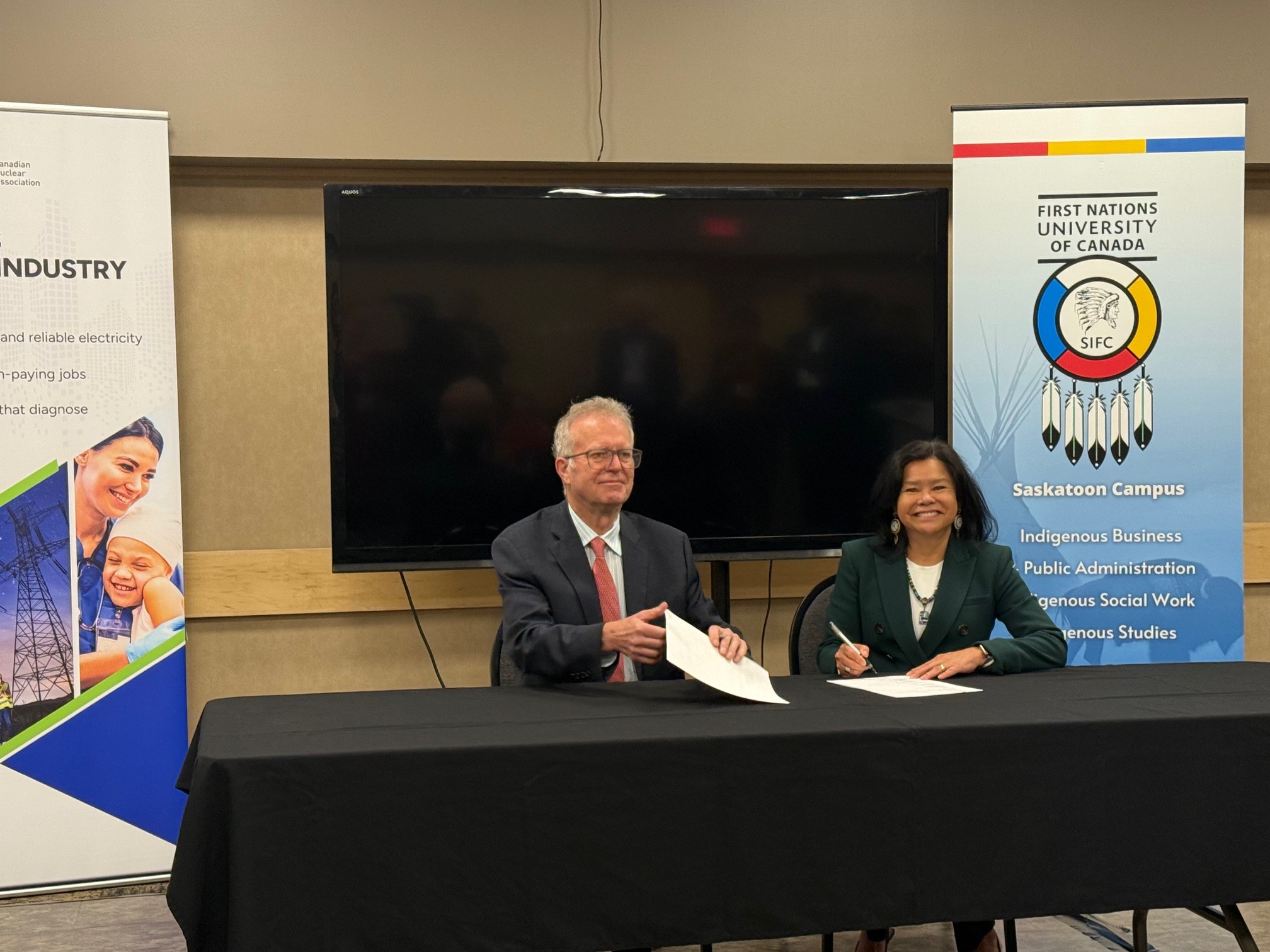
SASKATOON, SK — The First Nations University of Canada (FNUniv) and the University Network of Excellence in Nuclear Engineering (UNENE) have signed a Memorandum of Understanding (MOU) marking a new chapter in advancing nuclear and engineering sciences through the weaving together of Indigenous and Western ways of being, knowing, and doing. The agreement strengthens Indigenous leadership, participation, and capacity in Canada’s clean-energy and nuclear sectors.
The MOU was signed on October 21, 2025, at TCU Place in Saskatoon, on Treaty 6 Territory and the Homeland of the Métis. Leaders, faculty, and community representatives from both institutions gathered to celebrate this partnership rooted in reconciliation through education.
This collaboration comes at a pivotal time, as Canada moves toward cleaner, more sustainable energy systems. By combining FNUniv’s cultural and educational leadership with UNENE’s national network of 18 partner universities, the partnership will open new pathways for Indigenous students and researchers to engage in nuclear science, environmental monitoring, and innovation grounded in Indigenous perspectives.
Through this collaboration, FNUniv and UNENE will:
Dr. Jacqueline Ottmann, President of the First Nations University of Canada, said the partnership represents reconciliation in action.
“We are excited about this partnership as it recognizes the importance of Indigenous and Western knowledges as they relate to science, innovation, stewardship, and sustainability. As we continue to progress into a rapidly changing and complex world, nuclear and engineering sciences, environmental monitoring, and clean energy advancement will need to emphasize the inextricable interconnectedness between humanity and the land — that the health and wellbeing of both are interrelated,” said Dr. Ottmann.
“FNUniv and UNENE will be working together to create educational programs and learning experiences that will inspire students to develop, implement, and advocate for cleaner sources of energy. Indigenous people are integral to this kind of progress in Canada.”
Dr. John Luxat, President of UNENE, shared that the organization looks forward to this meaningful collaboration.
“UNENE is delighted to embark on this collaboration with the First Nations University of Canada, in a meaningful step toward building shared understanding and learning from one another. We deeply appreciate FNUniv’s vision and leadership in engaging with the UNENE network, and we look forward to this journey of growth together, combining nuclear science and Indigenous ways of knowing to achieve common goals.”
Beyond education, the partnership will explore opportunities for community-engaged research and land-based learning that bridge academic and cultural approaches to energy, sustainability, and environmental protection. The institutions also plan to collaborate on public education initiatives to raise awareness of Indigenous perspectives in science and technology — emphasizing balance, respect for the land, and long-term environmental responsibility.
An FNUniv–UNENE working group will begin developing new courses, professional learning opportunities, and community-based programs that reflect both Indigenous and technical knowledge systems. These efforts will expand pathways for Indigenous youth into nuclear education, policy, and environmental monitoring — contributing to greater representation in Canada’s energy sector and supporting the long-term goals of energy sovereignty and self-determination for Indigenous Peoples.
This collaboration positions FNUniv as a national leader in inclusive clean-energy education while reinforcing UNENE’s commitment to building a diverse and knowledgeable workforce for the future of nuclear innovation in Canada. Together, these institutions demonstrate how reconciliation and innovation can move forward hand in hand — uniting technology, education, and traditional knowledge for a sustainable energy future.
See media release here.